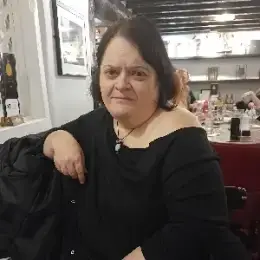Jacqui Schroeder, a teaching assistant from Nottinghamshire, met her husband, Steve, when he was 38. Speaking to Centre of Excellence, Jacqui said, “He was kind, caring, supportive and would help anyone. He was amazing with my children and grandchildren.” Working as a long-distance lorry driver, she explains Steve didn't have much time for hobbies but that he loved being on the road and working on their grown children’s cars when he was at home. Just a year after the couple met, Steve started to have issues with his memory. He was 39. This would mark the beginning of the family’s experience with early onset dementia — or working age dementia.
Alongside the memory loss, Steve’s personality also underwent some small changes. Speaking to Centre of Excellence about the family's experience of early onset dementia, Jacqui recalls, “He became quite suspicious too and very outspoken.” As his memory deteriorated more, multiple trips to the GP were unsuccessful. Various diagnoses were given, including depression due to Steve’s mother’s passing. Steve was even accused of simply not concentrating. At work, Steve had an upsetting annual review in which it was suggested he wasn’t as much of a team player as he had been in the past.
Meanwhile, at home, the family were struggling to cope, with little support and no idea that Steve might be suffering with early onset dementia. Steve had begun to call Jacqui every morning to list what he was doing that day and in what order. In hindsight, Jacqui says, he had started to lose his ability to process or sequence things he needed to do - from forgetting where he had parked his truck in Glasgow to not remembering to put his false teeth in to go to work. Doing their best to help, the family put things in place to help Steve remember.

For almost a decade, Steve, Jacqui and their family struggled. When Steve was 47, things came to a terrifying head when he returned home from an overnight work trip to Wales. Jacqui recalled, “We had been in bed for five minutes and he started to fit. It was so hard and lasted 45 minutes.”
The emergency services were called and initially suspected that Steve had suffered a stroke. He was rushed to the hospital where scans didn't reveal any clotting. When he came round he had lost the use of his left arm. The seizure had been so severe it had ripped Steve’s rotary cuff in his left arm and, according to Jacqui, from this point onwards Steve’s memory retention plummeted and became almost non-existent.
The day after his first seizure, doctors sent Steve for an MRI. It revealed atrophy in his brain similar to that of a 90-year-old. They were seen by a psychologist and neurologist. Jacqui said, “During this time, Steve changed beyond recognition and I was beside myself. I rang the memory service and was told it would be four months before he could be seen. At the end of my tether, I rang the hospital team.” Jacqui was then contacted by the working-age dementia team. After many more brain wave tests, referrals, and a SPECT scan, six months later, Steve was diagnosed with Alzheimer’s and frontotemporal dementia, as well as shrinkage in his frontal lobes, which had caused the seizures.

While diagnosis can sometimes be the first step to recovery and closure, for Steve, it was too late. He had suffered a mental break and had been readmitted to the hospital, where he stayed for three weeks. Steve had lost his car and HGV licenses and, alongside the stress of the diagnostic process, Jacqui said, “it was too much”.
The family was devastated to see Steve suffer. While he is still on his epilepsy medication twice daily now, Jacqui said “we all agreed we would help him to live well with dementia”. She added, “Our priority is and always will be to make him feel loved and valued, with an important role to play in our lives. His input to decisions has always been respected and even now although he answers about something totally different or random we still let him speak. We support him with tasks and just to try to keep him happy and give his life meaning.”
Jacqui tells Centre of Excellence that she decided to study the Dementia Awareness Diploma Course because “I wanted to learn as much as I could about the disease and then put my new knowledge and understanding into practice to best support Steve.” Of the course, Jacqui said, “It helped to make sense of things that were happening and why they were happening. It also helped me to see the disease and be able to separate the new behaviours as the disease and not the person. It gave me more insight and knowledge to keep fighting to keep Steve living as well as he could for as long as he could. It also gave me the thirst for more knowledge and I am actively seeking a more in-depth course to further my understanding.” She added, “Dementia can feel very personal and with FTD (frontotemporal degeneration) the behaviours are very hard to deal with.” In fact, it's so much more than memory loss.

At the time of publishing, entering the code LEARNING in the checkout will reduce the price of our Dementia Awareness Diploma Course to £29.






